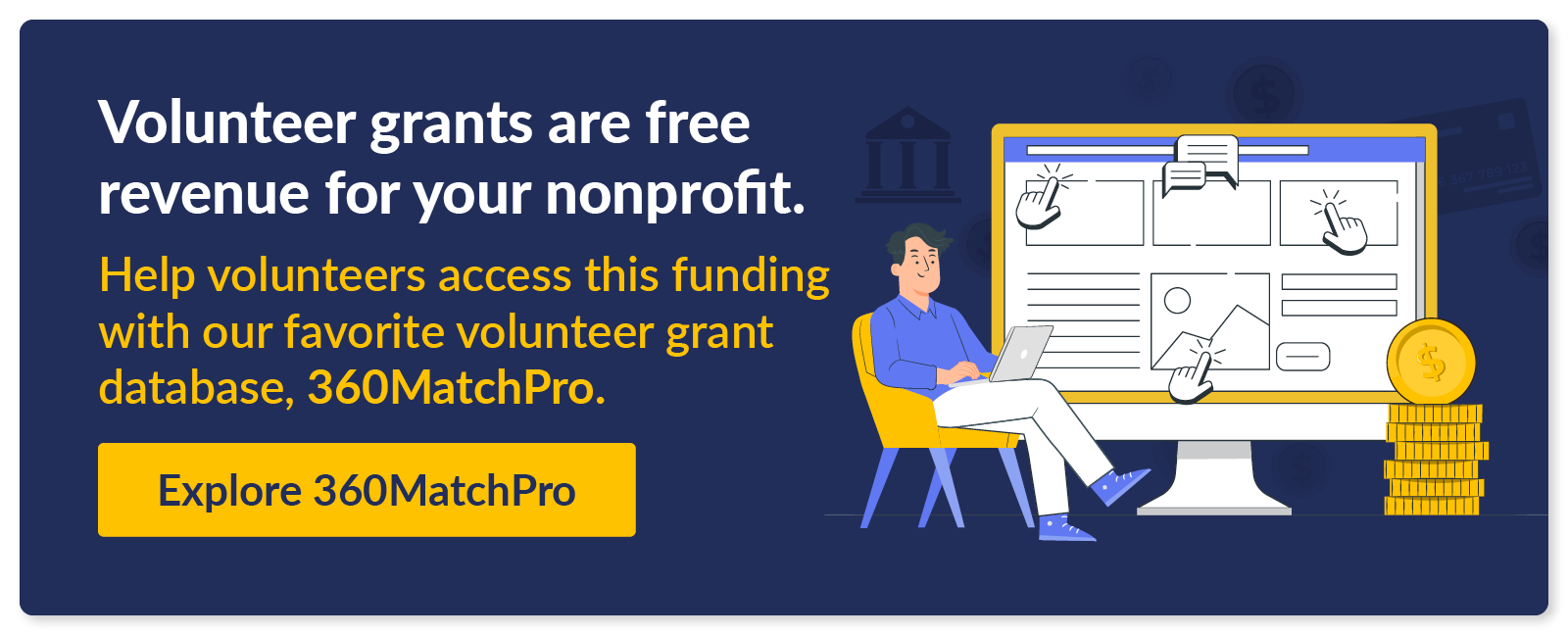Corporate Volunteer Grants: The Basics & How to Secure Them
As a nonprofit professional, you know that every dollar gets you closer to achieving your goals. You can boost funding and attract more volunteers for your nonprofit with a dedicated volunteer grant strategy.
We’ve put together this guide to walk through everything you need to know about volunteer grants. We’ll cover the following:
- Volunteer Grant FAQs
- How to Get Volunteer Grants for Your Nonprofit
- Best Practices for Securing Volunteer Grants
- Examples of Corporate Volunteer Grant Programs
If you’re not familiar with volunteer grants or aren’t sure how to maximize revenue from this channel, look no further! Let’s dive right in by answering frequently asked questions about volunteer grants.
Volunteer Grant FAQs
What are volunteer grants?

Volunteer grants are a type of corporate giving program in which employers provide monetary grants to organizations where their employees volunteer regularly. These programs are also known as Dollars for Doers, Dollar for Hour, Matching Time, and Grants for Time programs.
For example, if your nonprofit has a dedicated volunteer who devotes 5 hours a week to your organization and their company has a volunteer grant program, the company will pay you for those hours.
The exact amount of time a supporter needs to volunteer to earn a grant for your nonprofit depends on their employer’s specific program requirements. Work with your volunteers to help them discover their eligibility and take the steps necessary to secure a volunteer grant.
What are the benefits of volunteer grants?
The main draw of volunteer grants is extra funding for your organization at no cost to supporters. Beyond that, volunteer grants have benefits for everyone involved in the process:
- Individual volunteers can make an even bigger impact with the hours they give to your nonprofit. Volunteers already care about your mission and purpose; now they can give you twice the support through the work they’re already doing.
- Companies that offer volunteer grants benefit from maintaining a positive public image. This positive reputation also means their consumers and employees will be happier to work with them.
- Nonprofits benefit by building stronger relationships with both companies and volunteers. Volunteer grants give supporters another way to support your nonprofit, increasing their investment in your organization. And if you have a lot of volunteers who all work for the same employer, you may secure a corporate relationship that could turn into a sponsorship!
Some companies even offer team volunteer grants, where groups of employees from the same company can volunteer together and secure a larger grant for your cause.
Why do businesses offer volunteer grants?
To secure corporate support, nonprofit organizations usually rely on companies to already have corporate social responsibility (CSR) programs like volunteer grants or volunteer time off in place. However, by understanding why businesses offer volunteer grant programs and researching the employers your supporters work for, you or your donors may be able to persuade certain companies to start new CSR initiatives.
Reports show that employees who work at companies with volunteer programs are five times more engaged than those who don’t. When pitching a volunteer grant program to businesses, emphasize statistics like this and how they can lead to improved business outcomes, such as increased employee productivity and retention.
Additionally, remain open to other types of corporate volunteerism. For example, some businesses arrange organized corporate volunteer groups, which serve as team-building activities for their employees while also providing your nonprofit with extra help for your ongoing programs.
Are volunteer grants common?
Yes, volunteer grants are a common business practice! We’ve pulled together some key statistics from Double the Donation that demonstrate how common and impactful these programs are:
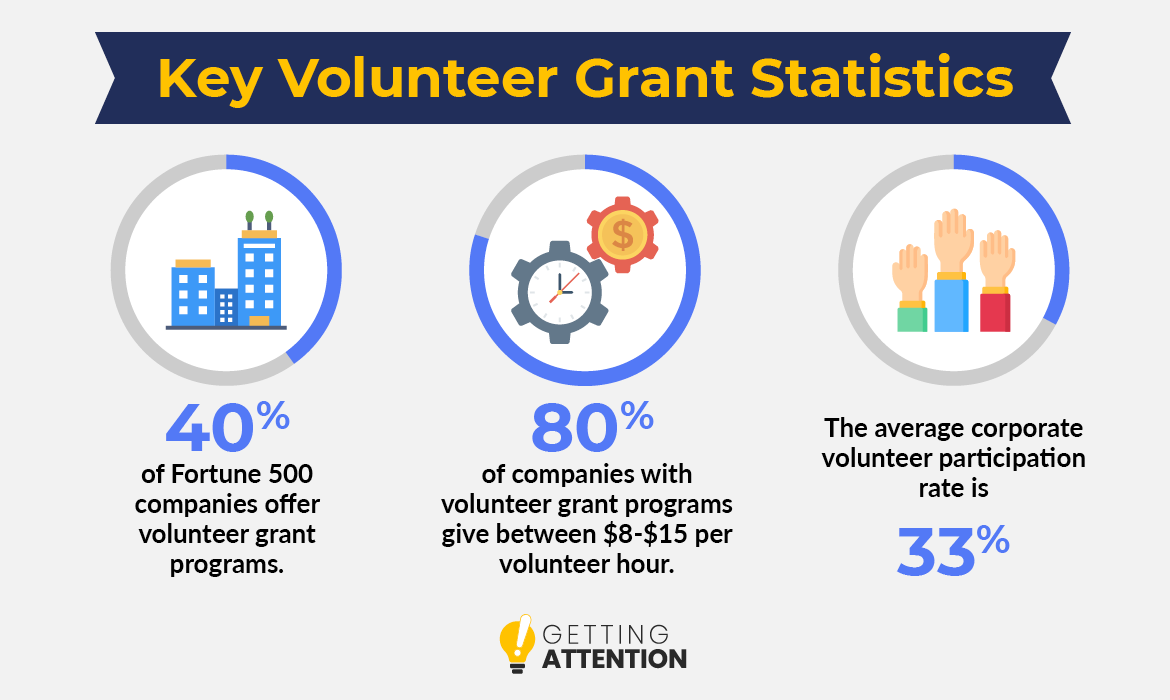
- 40% of Fortune 500 companies offer volunteer grant programs. Plenty of other businesses and corporations also have some sort of volunteer grant program.
- 80% of companies with volunteer grant programs give between $8-$15 per volunteer hour. Those dollars add up! If you have a dedicated group of volunteers, those accumulated hours can result in a nice annual sum.
- The average corporate volunteer participation rate is 33%. About a third of eligible employees currently take advantage of corporate volunteer opportunities. However, when it comes to volunteer grants, that rate drops to just 3%, indicating that volunteers don’t know about this opportunity. Nonprofits are working to increase these numbers by marketing their volunteer programs.
From these statistics, it’s clear that there are plenty of volunteer grant opportunities that your organization and its supporters can take advantage of.
How to Get Volunteer Grants for Your Nonprofit
To secure volunteer grants, you first need to understand how the process works. From your nonprofit’s perspective, it happens in four steps:
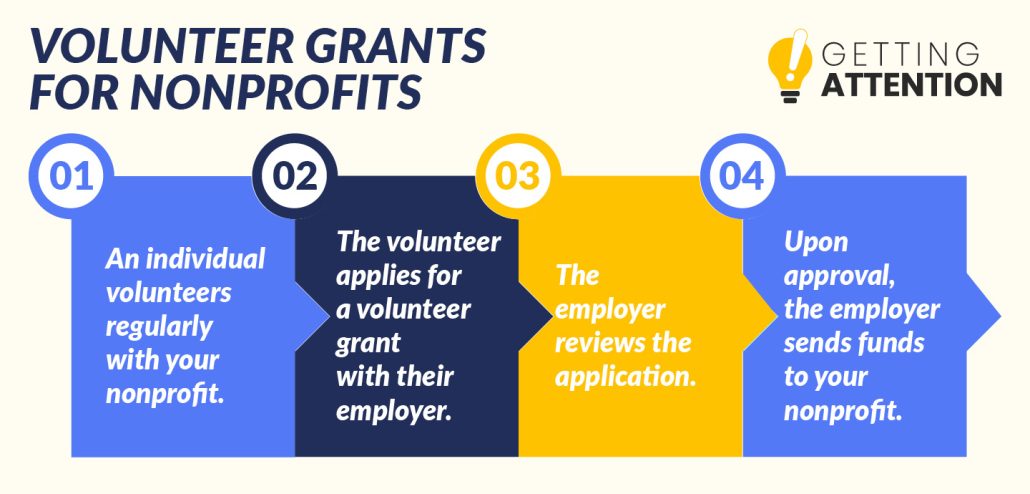
- An individual volunteers with your nonprofit. This can include helping with your programs, volunteering virtually, or participating in any other roles your organization offers.
- That individual looks up their volunteer grant eligibility. If they qualify, they’ll submit a request to their company for the grant.
- The employer looks over the application and confirms eligibility.
- Once the company has verified the hours with your nonprofit, your nonprofit gets a check!
Companies’ volunteer grant requirements vary, but there’s generally a minimum number of hours that must be volunteered to qualify for a grant. Once the volunteer hours threshold has been met, the company will either pay by the hour or a set amount. For example, one company might pay $15 per volunteer hour, while another pays a flat $500 after 40 hours have been contributed.
Unfortunately, most volunteers don’t even know whether they’re eligible for a grant or how to check their eligibility. That means it’s up to your nonprofit to help volunteers earn the grants they rightfully deserve.
Best Practices for Securing Volunteer Grants
How do you get the word out about this mutually beneficial opportunity? Just follow these three best practices:
1. Market volunteer grants to your supporters
You can’t secure volunteer grants if your supporters don’t know what they are or how to request them. That’s why it’s crucial to create a marketing plan that promotes these opportunities to your supporters.
As you develop your plan, consider these strategies:
- Create a page on your website that explains the volunteer grant process and how to submit a request. This can be added to your volunteer sign-up page, “Ways to Give” page, or a new page. Additionally, this is a great place on your website to add a volunteer grants search tool, which we’ll discuss soon.
- Launch a social media campaign that educates donors on volunteer grant basics and encourages them to check their eligibility. Try sharing statistics about volunteer grant participation and impact, as well as stories from beneficiaries about their positive experiences with your volunteers.
- Highlight volunteers and companies who contribute volunteer grants in your monthly newsletter. This creates social proof and can inspire supporters to check their own eligibility.
Once you’ve created basic volunteer grant marketing materials for your website, you can expand your reach by leveraging the Google Ad Grant. The Google Ad Grants program provides eligible nonprofits with $10,000 a month in credits to spend on Google search ads.
Through the Google Ad Grant program, your organization can create ads that show up at the top of Google search results pages for relevant terms, like “volunteer opportunities near me” or “animal shelter volunteering.” Highlight volunteer grants in these ads, and you’ll promote the opportunity to a whole new audience of potential volunteers!
2. Offer a variety of volunteer opportunities
Ensure you have volunteer activities that supporters find interesting to encourage continued support. Consider creating various ways to get involved that fit various skill sets, time slots, and physical requirements.
For example, you might have a physically intensive volunteer opportunity for supporters to work in a community garden where they can learn about plant care on the job. In contrast, you might also offer a remote volunteer opportunity for data entry.
Additionally, have activities that groups of volunteers can participate in. This will accommodate corporate volunteer teams to secure more corporate volunteers, increase the grant money you receive, and help your nonprofit build a long-term relationship with the company they came from.
3. Use corporate giving software
Whether you’re looking to secure volunteer grants, matching gifts, or any other kind of corporate support, streamlining the application process is a surefire way to maximize donations. And you can do just that with a volunteer grant database.
Our favorite volunteer grant database is Double the Donation Volunteering. Double the Donation offers nonprofits support for both matching gifts and volunteer grants. Here’s how the volunteer grant component of this platform works:
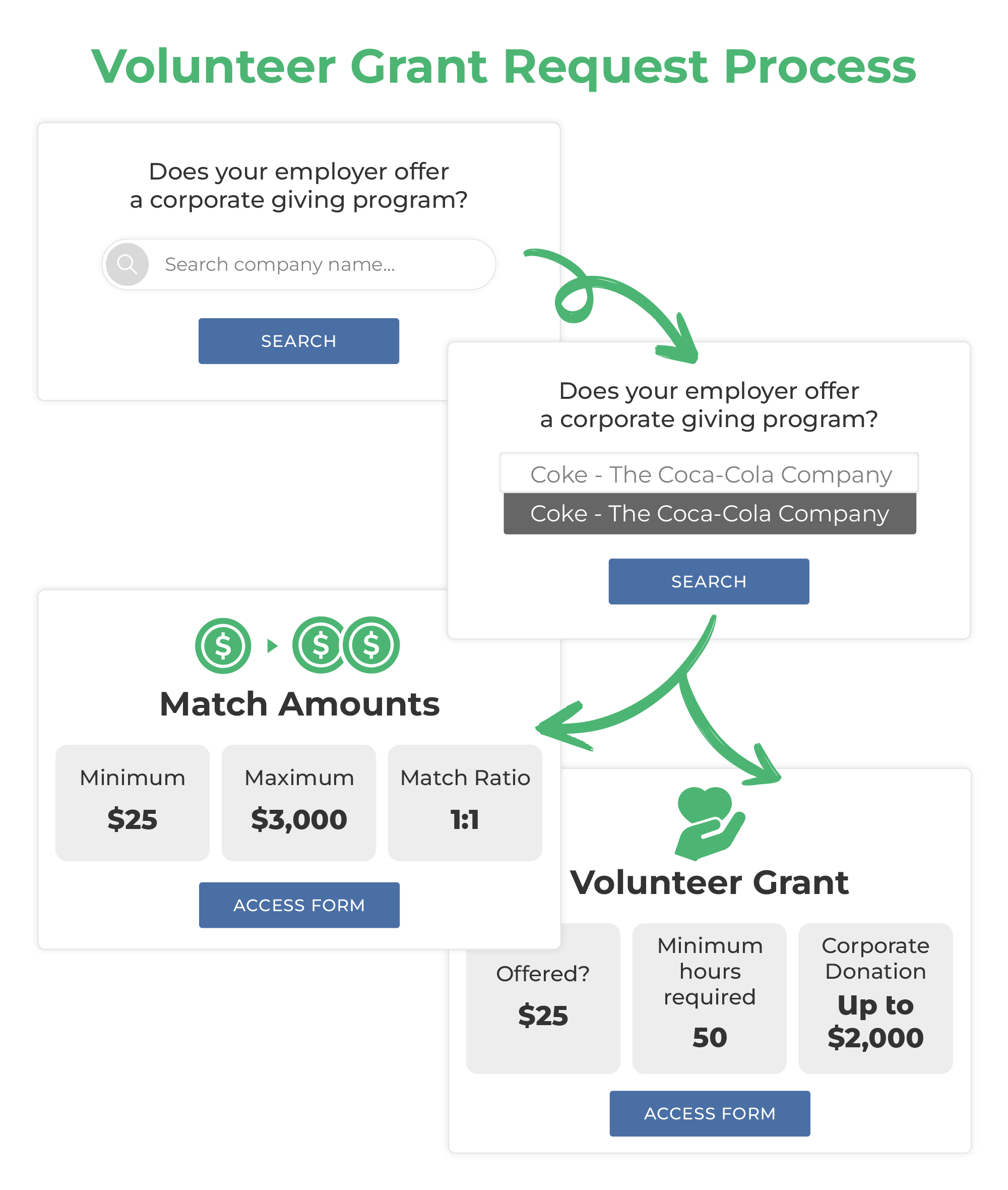
- The volunteer searches for their employer. Volunteers can enter their company’s name into Double the Donation’s employer search tool. This tool can be embedded on any page of your website. That way, you can put it wherever you think volunteers are most likely to check, like your volunteer information page.
- The search tool identifies the employer. If the employer is in Double the Donation’s database, it will autofill to streamline the search process. Double the Donation’s database currently covers 99.68% of match-eligible donors, meaning your volunteers will likely be able to find their employers.
- Volunteer grant information is provided. Double the Donation provides detailed volunteer grant information for every employer. This includes which employees are eligible, how many hours must be volunteered, how much the grant will be, and if the company offers other corporate volunteer opportunities, like team volunteer grants and volunteer time off.
From there, the software will direct volunteers to the next steps they need to take to request a volunteer grant. This will usually be to complete a form for their employer that documents their volunteer hours and details about your nonprofit, such as your mission statement and contact information.
Some companies may reach out to your nonprofit for confirmation, while others might consider the process done after reviewing an employee application. Either way, be ready to work with your volunteers to answer their questions and support them through the volunteer grant process.
Examples of Top Companies with Volunteer Grant Programs
Take a look at some of the top companies with volunteer grant programs to get an idea of how much businesses invest in corporate philanthropy.
Verizon’s Volunteer Grant Program
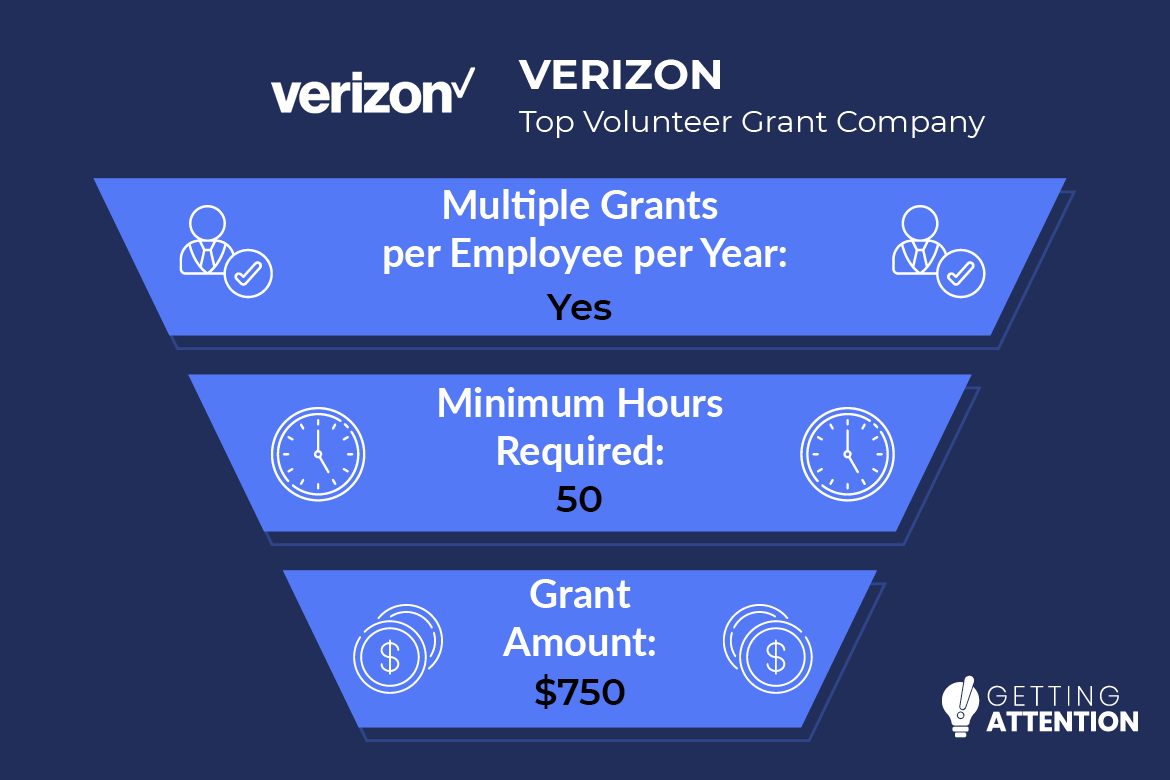
Verizon offers a Volunteer Incentive Program (VIP), which awards $750 to an organization after an employee volunteers 50 hours with that organization. Even better, Verizon employees can request up to two of these grants per year.
Microsoft’s Volunteer Grant Program
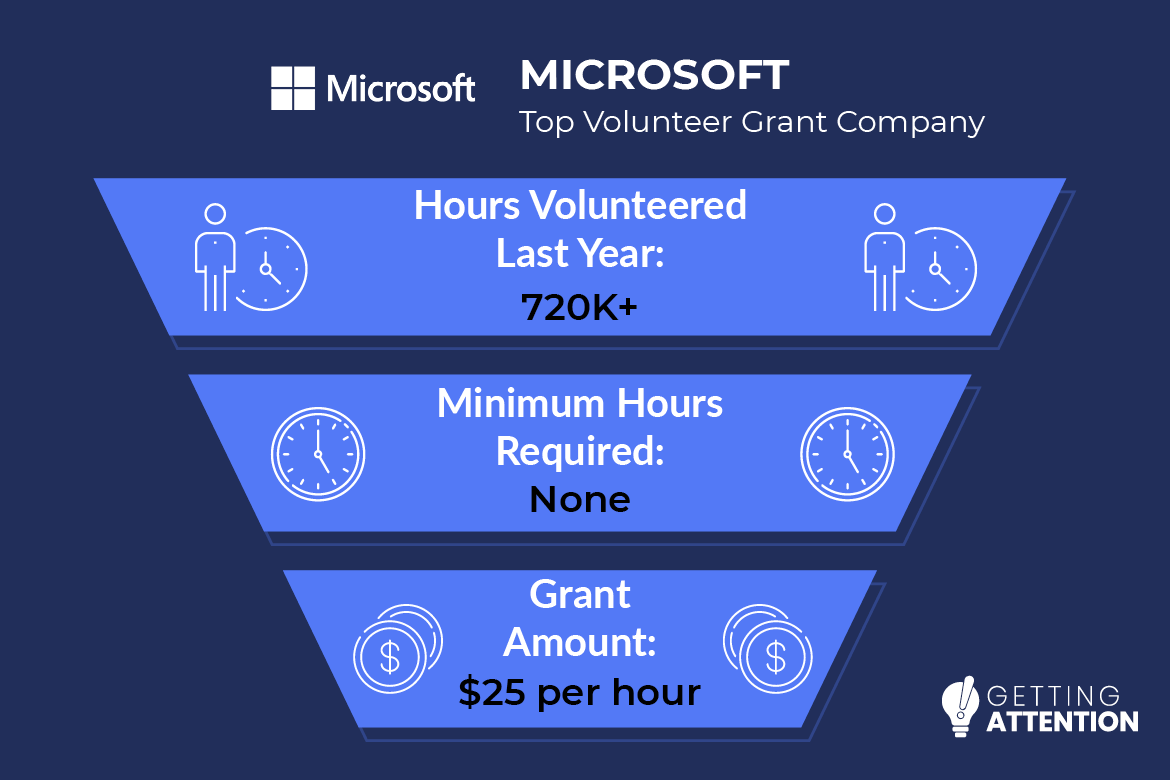
Microsoft has a generous volunteer grant program with no minimum hours required. Microsoft employees can earn $25 per hour they commit to a nonprofit. Last year, almost 30,000 employees took advantage of this program and volunteered over 1 million hours in total.
ExxonMobil’s Volunteer Grant Program
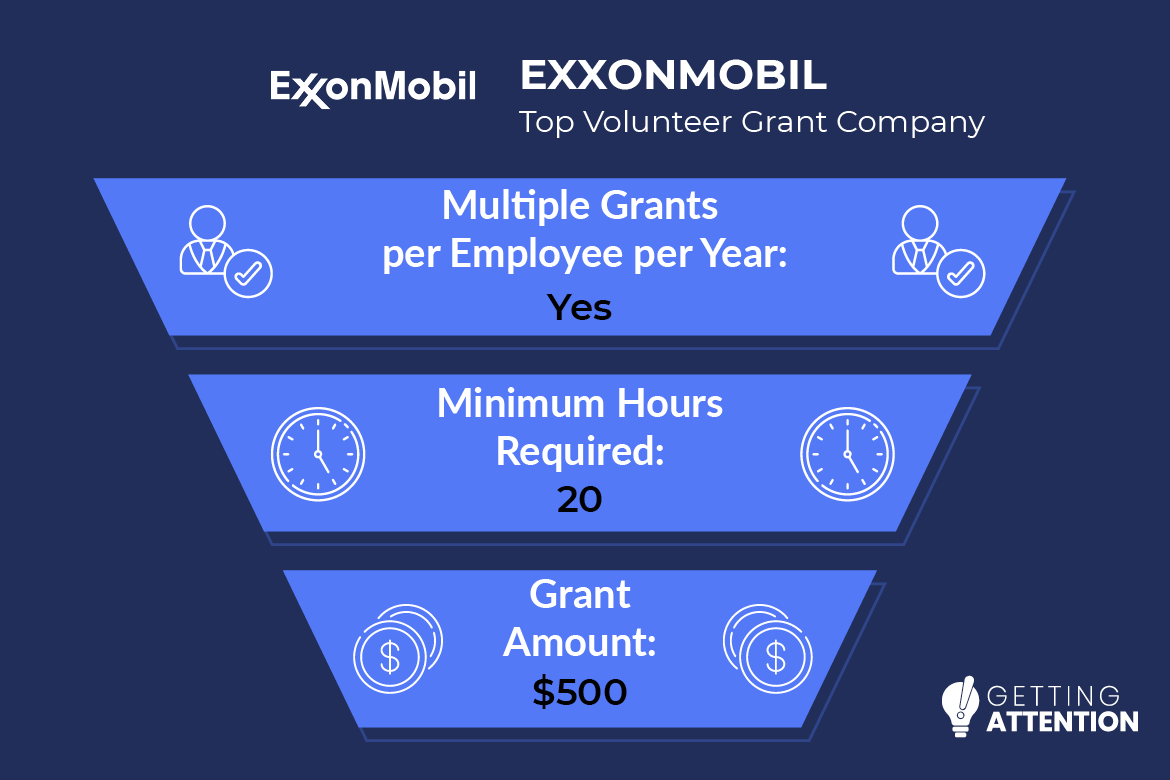
ExxonMobil has multiple volunteer grant programs: an individual volunteer grant program through which employees can secure a $500 grant after volunteering 20 hours with an organization and team volunteer grant opportunities for groups of five or more.
Additional Volunteer Grant Resources
Tapping into volunteer grants doesn’t have to be daunting. The more knowledge your team has about these opportunities, the more successful you’ll be at locating and securing these valuable contributions.
We hope this guide has helped your organization realize all the untapped volunteer grant opportunities you can benefit from! If you want to continue your research, we’ve picked some great resources to get you started:
- Nonprofit Marketing Ideas You Need to Promote Your Cause. Use these tips to promote volunteer grants to your supporters and generate more traction for your volunteer program.
- 14 Important Matching Gifts Questions You Need to Ask. Matching gifts are another common type of corporate giving program. Learn the essentials with our guide.
- How to Win At Corporate Philanthropy: A Nonprofit Guide. All of the giving programs we’ve mentioned fall under a bigger umbrella: corporate philanthropy. Learn more about what that means with this guide.



